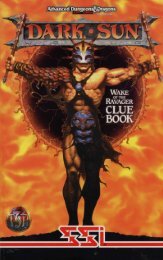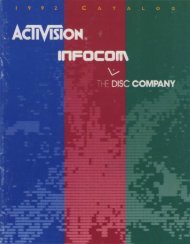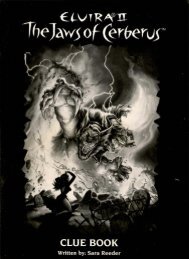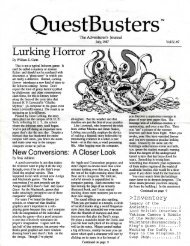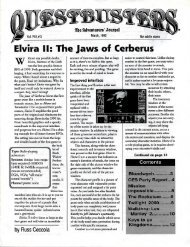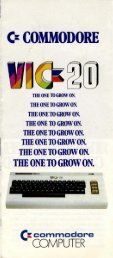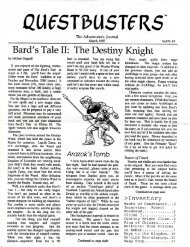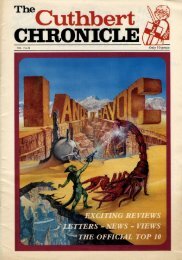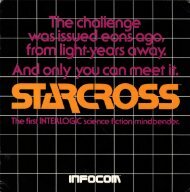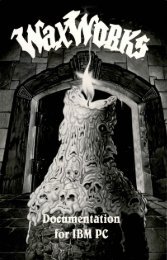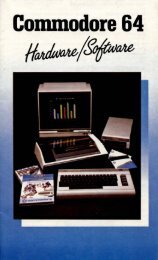Sentinel Worlds I: Future Magic - Museum of Computer Adventure ...
Sentinel Worlds I: Future Magic - Museum of Computer Adventure ...
Sentinel Worlds I: Future Magic - Museum of Computer Adventure ...
Create successful ePaper yourself
Turn your PDF publications into a flip-book with our unique Google optimized e-Paper software.
Continued from previous page<br />
music, but I did notice that the sound was<br />
a bit mellower on the Tandy machines.<br />
Moving is the Key<br />
Movement is accomplished with the<br />
four cursor keys. The left and right arrows<br />
change your direction in 45-degree<br />
increments (90 degrees indoors) and the<br />
up arrow moves you forward. In space,<br />
the up arrow increases thruster strength,<br />
while the down arrow reduces it.<br />
Another key to keep in mind is the<br />
space bar. Technically, this is used for<br />
aiming your laser. The real importance <strong>of</strong><br />
targeting is to select people to question.<br />
The majority will either not want to talk,<br />
or won't have much to say. From time to<br />
time, however, you will find someone<br />
with valuable information. These special<br />
people usually show up on your scanner<br />
as slightly lighter colored blips.<br />
Are We Having Fun Yet?<br />
A great deal <strong>of</strong> the early game, as with<br />
many RPGs, is spent building up party<br />
statistics and increasing funds. There are<br />
several ways to do this. You can mine for<br />
three different kinds <strong>of</strong> ore on the planets,<br />
escort trader ships to their destinations,<br />
destroy enemy raider ships or pick up lost<br />
equipment for the Science Foundation.<br />
I found science runs were the most efficient<br />
method for getting cash in the early<br />
game. The only problem is that it<br />
doesn't allow you to increase the experience<br />
or attributes <strong>of</strong> your party members.<br />
Once you have enough money from<br />
science runs, buy some decent equipment<br />
and start trying to build up personal<br />
attributes.<br />
Promotions are given based on experience<br />
in combat. But before you start battling<br />
their ships, try to find Grager's blue<br />
merchant class vessel. If you board it and<br />
talk to him, he'll quadruple your firing<br />
power. Then Program the ship's computer<br />
to fire on the hull. Try to find an individual<br />
raider far enough away from its<br />
group to be taken on separately, then hit<br />
the space bar to target it. When the hull<br />
is breached, your entire crew gets experience<br />
points. Later, you will be able to<br />
board the enemy ships and raid their armory,<br />
but wait until you are at least a<br />
Combat Cadet. Keep killing raiders between<br />
science and refueling runs, and<br />
12 QuestBusters<br />
your crew will soon be prepared to delve<br />
into the deeper secrets <strong>of</strong> this solar system.<br />
While you're at it, check out the<br />
town on Norjeann to find the armory and<br />
ammo chest.<br />
Who Done It?<br />
The designer and creator <strong>of</strong> the <strong>Sentinel</strong><br />
<strong>Worlds</strong> saga is Karl Buiter, a life-long<br />
science fiction buff. Along with graphics<br />
help from Michael Kosaka and some<br />
sound advice from Dave Warhol, Karl put<br />
"Science runs<br />
were most effective<br />
for getting<br />
cash early<br />
in the game/7<br />
together this first chapter in what could<br />
turn into the next major series.<br />
<strong>Future</strong> <strong>Magic</strong> is classed as a Science<br />
Fiction mystery, like Star/light. The big<br />
difference is that this game is a lot more<br />
full-bodied, with finer attention to detail.<br />
To give Star/light proper credit, it was an<br />
incredibly complex game for its time and<br />
remains a classic. But fortunately for all<br />
<strong>of</strong> us, time marches on, and computer<br />
gaming on MS DOS machines is advancing<br />
technically at an unprecedented rate.<br />
So What's Not to Like?<br />
There were only three things I really<br />
didn't like about <strong>Future</strong> <strong>Magic</strong>. One is<br />
that it plays horrendously slow on a standard<br />
8088 machine with a 4.77 MHz<br />
clock speed. I tried it on my Tandy 1000<br />
briefly but gave up and moved to a<br />
1000TX, whose was more acceptable.<br />
This is not really a fault. As I said before,<br />
games for MSDOS machines are being<br />
pushed faster and further than ever before.<br />
One <strong>of</strong> the trade<strong>of</strong>fs is that as sound<br />
and graphics improve, older hardware is<br />
being pushed closer to its limit. The net<br />
result is well worth increasing the video,<br />
audio and speed <strong>of</strong> your machine closer<br />
to today's standard.<br />
The second thing I disliked was the<br />
feeling that I was missing a lot. From<br />
time to time a new beacon would show up<br />
on a planet's surface. I suspected that if I<br />
questioned people more fully, I'd get<br />
some hints that would lead me to these<br />
places on my own, but I rapidly became<br />
bored with questioning hundreds <strong>of</strong> people<br />
who seemed to have only three or four<br />
standard answers, so I started talking only<br />
to those special people I spoke <strong>of</strong> earlier.<br />
And I disliked the way the program installed<br />
on my hard disk. I have spoken<br />
before about my preference for putting a<br />
game where and how I want. <strong>Future</strong><br />
<strong>Magic</strong> can be installed on any disk you<br />
like, but must be in two separate directories<br />
called FMPLAY and FMDAT. In the<br />
first place, I see no reason why two directories<br />
are necessary. In the second place,<br />
it should be easy to put that directory in a<br />
path <strong>of</strong> your choice and select your own<br />
name for it. The average hard drive owner<br />
has enough extra directories and minimally<br />
descriptive names to worry about<br />
without aggravating the situation.<br />
In the Box<br />
<strong>Future</strong> <strong>Magic</strong> comes in a nicely illustrated<br />
box that contains two manuals, a<br />
quick reference card, two 5.25" floppy<br />
disks and an ad for the <strong>Sentinel</strong> <strong>Worlds</strong><br />
hint book. The larger <strong>of</strong> the two manuals<br />
<strong>of</strong>fers background and details on how to<br />
play. The other has the Paragraphs.<br />
There is also a card that can be sent in<br />
along with $7.50 to get the 3.5" micr<strong>of</strong>loppy.<br />
Or you can pay extra for a separate<br />
package with both disk formats.<br />
You will find considerable enhancement<br />
in both speed and visual effects if<br />
you have a hard drive and EGA or Tandy<br />
TGA video. I also recommend a minimum<br />
8 MHz clock speed, or movement<br />
seems more like a chess game. The disks<br />
are unprotected.<br />
Conclusions: With the few minor quibbles<br />
that I have mentioned, I would say<br />
that <strong>Future</strong> <strong>Magic</strong> is a great success.<br />
Graphics are superb, and sound is more<br />
than acceptable. The plot is substantial,<br />
and the wide variety <strong>of</strong> options and<br />
equipment is guaranteed to give all<br />
players more than their money's worth.<br />
Skill Level: Intermediate<br />
Copy Protection: Must have game<br />
manuals<br />
Price:$49.95 (5.25"); $54.95 (both disk<br />
formats)<br />
Company: Electronic Arts



